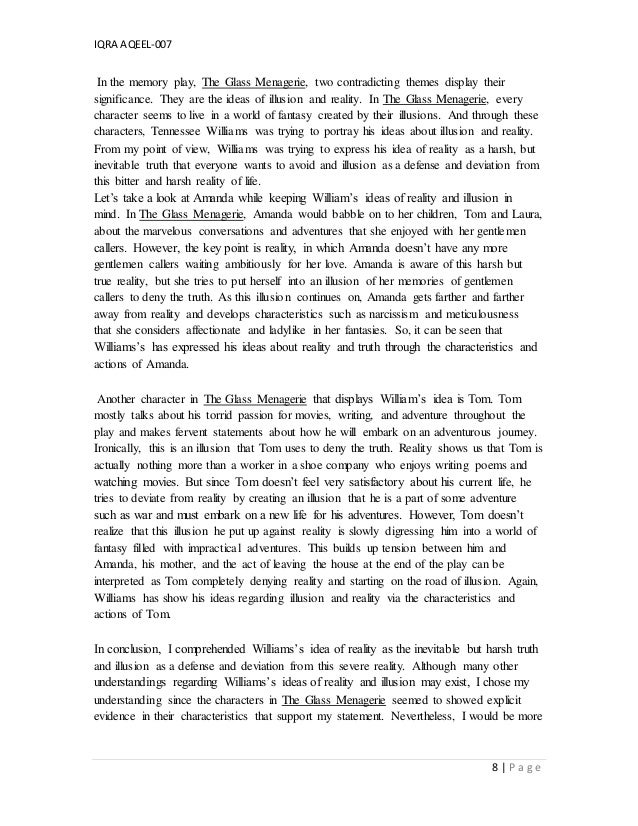

I don't know if Tom's decision to leave his mother and sister can be couched in terms of “right” or “wrong”.

#The glass menagerie monologue how to#
RG: The tragedy of the Wingfield family is that they love each other desperately but don't know how to navigate their individual priorities or desires without hurting one another. Do you think Tom made the right move walking away from his mother and sister? What do you think happened to Laura afterwards? RQM: I love director Geoff Elliot's notion that Amanda's protection of her children is the very thing that is decaying them and preventing them from growing. Whether this is meant poetically or not, I have found it helpful, in the playing of it, to take Williams at his word. In the final monologue of the play, Tom says that “a bit of familiar music” or “a piece of transparent glass” can make his long-lost sister manifest physically. Williams, like Proust, knew about the incredible potency of memory. He is capable of looking back on his earlier life and analyzing the circumstances of his departure from his family with the benefit of years of experience, but when he is inside the action of the play he is completely overwhelmed, living it, victimized by it. He is, at once, something of an omniscient narrator, while also being helpless in the riptide of his own memories.

Rafael Goldstein (RG): That is the primary challenge of playing Tom. Playing Tom, what was your process navigating his memories of his family and his dilemma in the present? Mason (RQM): The Glass Menagerie is noted for innovating the contemporary memory play. We could not help but gush over what it means to return this play to its technologically and meta-theatrically adventuresome roots in A Noise Within's current production. Recently, I interviewed actor Rafael Goldstein, who is playing Tom Wingfield in the Geoff Elliot-helmed production. Now, more than 70 years since The Glass Menagerie first appeared on Broadway, A Noise Within is reviving the work. Sounds like something out of a Paula Vogel text. Fourth wall address, projections of imagery and text, and expressionistic music are prominently featured as narrative devises. However, what has always fascinated me about the play as it appears on the page (particularly in Tennessee Williams' stage directions) is how experimental, meta-theatrical, and innovative the piece wanted to be. Like memory, as Williams invokes it in the script, our perspective on the play is often-times romantic, soft, nostalgic. It exists in a place somewhere between venerable literary text and dramatic playscript. Most of us have had to study it – perhaps in drama school or high school literature class. And so, goodbye.Tennessee Williams' The Glass Menagerie is as classic and American a drama as they come. For nowadays, the world is lit by lightning. Anything that will blow your candles out. I reach for a cigarette, I cross a street, I run to the movies or a bar. I tried so hard to leave you behind me but I am more faithful than I intended to be. Then, all at once, my sister touches my shoulder, and I turn around and look into her eyes. Tiny transparent bottles and delicate colors like bits of a shattered rainbow.
#The glass menagerie monologue windows#
Windows filled with pieces of colored glass. "I pass a lighted window of a shop where perfume is sold. Perhaps I'm walking along the street at night in some strange city before I have found companions. Perhaps it was only a piece of transparent glass. I would have stopped, but I was pursued by something that always came upon me unawares - taking me all together by surprise. I traveled around a great deal and the city swept about me like dead leaves, leaves that were brightly colored but torn away from the branches. I descended the steps of our fire escape for the last time and from then on, I followed in my father's footsteps attempting to find in motion what was lost in space. I went much further, for time is the longest distance between two places. HW2 Radio Play: based on the final monologue from The Glass Menagerie (Tennessee Williams) for panned voice, violin and wind composed/recorded by Aditya Chander


 0 kommentar(er)
0 kommentar(er)
